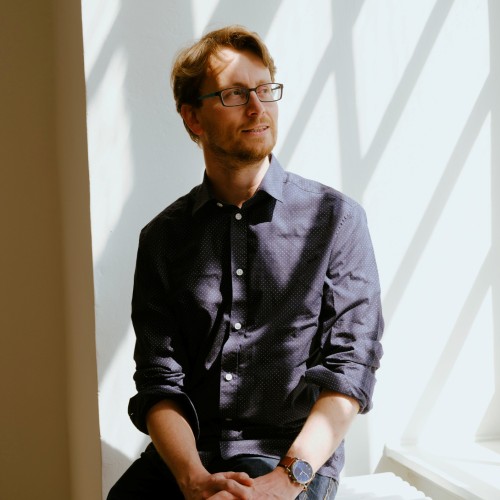The politicisation of the future
Athene Young Investigator Jens Marquardt focuses on environmental and climate politics
2023/06/28 by Astrid Ludwig
In times when climate activists are gluing themselves to roads and the phasing out of combustion engines and gas heating is the source of heated debates in society, Jens Marquardt’s field of research is highly topical. The political scientist and Athene Young Investigator at TU Darmstadt is investigating the different ways in which environmental issues and climate change are being politicised. His research focusses on traditional political discourses, social conflicts, populism and the politicisation of the future – using the example of a climate-neutral society. Marquardt’s research does not only focus on Germany but also on democracies in the Global South, such as India.

“I am a social scientist through and through”, says Dr. Jens Marquardt. The 37-year-old studied political science at FU Berlin, was actively engaged in environmental organisations and development initiatives as a young person, collaborated with the German Agency for International Cooperation (Deutsche Gesellschaft für Internationale Zusammenarbeit – GIZ) during his PhD and worked at various universities. When it comes to environmental or climate politics, the research carried out by the new Athene Young Investigator (AYI) has focussed on a wide range of contexts – both in Germany and also internationally. He wrote his diploma thesis and doctoral thesis on the political framework conditions relevant to the promotion of renewable energy, where he mainly concentrated on aspects of power, coordination and the role of international actors.
“I asked the traditional ‘why’ questions to identify areas of contestation”, says the political scientist from TU Darmstadt. Marquardt critically evaluated what is considered normal and what is deemed to have no alternatives. Perhaps it is not surprising that he originally wanted to become a journalist but ultimately decided to pursue an academic career. The 37-year-old researcher now also wants to apply the traditional “why” questions to his research project, in which he is being funded by TU Darmstadt as an Athene Young Investigator. In the process, he wants to analyse and explain the political discourse surrounding climate change and look at the importance of standards, values and perceptions of the future in this context. Marquardt calls this the “ideological substructure”.
Dr. Jens Marquardt ,
Athene Young Investigator
I asked the traditional ‘why’ questions to identify areas of contestation.

The researcher at TU Darmstadt wants to expand the meaning of the term “politicisation”. “Which political discourses emerge around climate change, which social groups stand in opposition to each other and which competing perceptions of a climate-neutral society exist? How is the future being politicised and also instrumentalised by political forces?” Jens Marquardt believes that climate policy often focuses too much on questions of technical feasibility. Ambitions to decarbonize societies are reduced to the introduction of new technologies such as e-mobility or hydrogen.
This approach initially appears relatively emotionless but conceals some potentially explosive social issues. For example: Who can afford an electric car and are there alternatives to private transport? What does the energy-focussed renovation of buildings mean for tenants and building owners from a financial perspective? Who benefits from new technologies and who is disadvantaged? Which social conflicts trigger climate policy measures and what forward-looking ideas are they based on? Marquardt aims to also investigate these questions from the perspective of organisations such as Fridays for Future or Last Generation (Letzte Generation) and in discussions with their members. “The future aspect is crucial for my AYI research project”, he emphasises.
The Global North and the Global South
He also wants to investigate all of these questions from the perspective of different countries. For example, Marquardt will focus on Germany as an example of the Global North and compare it with India as a country from the Global South. “The conditions in both countries are very different and so are the political constellations and challenges.” Marquardt is also interested in how these two democracies deal with the climate crisis and environmental policy issues.
The political scientist has always worked internationally. He was a postdoc at the University of Stockholm, a visiting research fellow at Harvard University and participated in research projects in Southeast Asia. At TU Darmstadt, Marquardt works in the team headed by Prof. Markus Lederer in the Department of History and Social Sciences and is currently part of a joint DFG research project with the University of Potsdam on the institutionalization of climate change mitigation efforts in Brazil, India, Indonesia and South Africa.
His selection as an “Athene Young Investigator” is thus essential to the young researcher. “It increases the visibility of my work and offers me more freedom in selecting the field of research.” Marquardt wants to supervise doctoral students – with the ultimate aim of becoming a professor one day. “I want to provide my students with creative and interactive teaching and stimulate critical thought.”
The Athene Young Investigator Programme
The Athene Young Investigator (AYI) Programme at TU Darmstadt supports exceptional researchers on their career path for a period of five years. The aim is to promote the scientific independence of early career researchers and give them the opportunity to qualify for the post of university professor by leading an independent junior research group. The heads of these junior research groups are given certain professorial rights and their own budget.
In 2023, the TU Darmstadt has awarded another four excellent young researchers as “Athene Young Investigators”. In the coming weeks, we will introduce the four researchers on the TU Darmstadt website.




